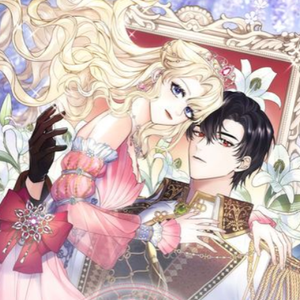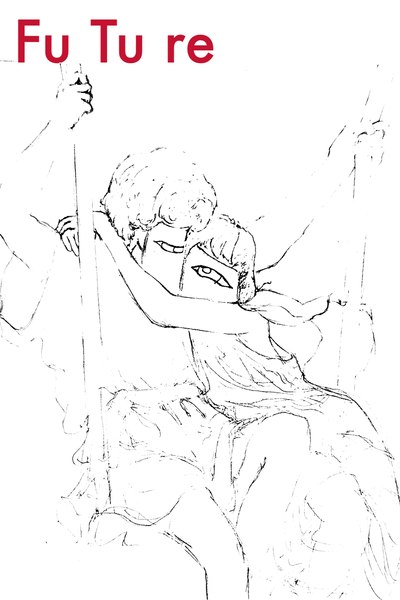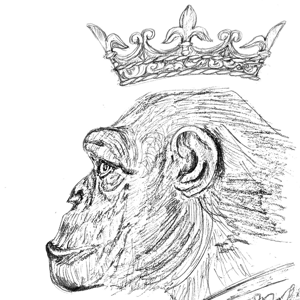When she woke again, she wordlessly followed the gentle orders of her parents and the pastor, Reverend Liues, stepping onto land to garb in ceremonial robes the mortuary provided. Then they all waited for dawn.
Black cloaks with small, sewn diamonds enveloped Forti and her family in night skies dusted in constellations. A silver band curved around the back of their heads and rested on their ears like glasses, holding a weighted cloth that fell over their faces. The audience would not be able to see them, but they would see all.
The wide stone platform they kneeled on was cool, having inhaled the fresh night air, and dark, like a rock wet from rain, although there had not been a drop for days. Forti pressed her palm to its surface, felt the chill saturate into her skin.
Behind her was the body of Vasibeth, cleaned and form-fitted in pearl-white, linen wrappings up to her neck and down to her ankles, raised and resting in a crib of synthetic ivory. Vasi’s hair was fanned out underneath her, her hands and feet were painted over, and her face was covered by a heavy square sheet of fabric marked with a mandela pattern. Her torso was blanketed down to her thighs by similar, decorated fabric, which tapered into a point that ended between her knees. Her open casket was splashed with divine design by the skilled mortuary’s artist.
In the color of bone and at the full height of a mature dogwood, the star cross of Pahth stood over Vasi, guarding the plains of fertile grass beyond it that sloped up a hill.
Over it, more fields resided, treated with emrephor salts so no creature, bug, or worm would even go near a blade of grass or overturn a speck of dirt.
The guests came like dried leaves swept by a breeze, dressed respectfully in their mourning clothes. Most were family, wearing the white and indigo sarlbett. Arms were encircled tightly by bandages to imitate the deceased, reaching the neck and disappearing under a band over the chest, and a sheer bliaut shrug with draping sleeves cut at the elbows was worn atop. Tied at the waist, a long, flowing skirt that hid the feet. Forti and her family wore sarlbetts as well, though in black and white and concealed by the ceremonial mantle.
People sat cross-legged on white cushions that were arrayed on a plot of pebbles. Every seat was taken by sunrise. The funeral began.
In Emhuin, the old language, Reverend Liues sang a hymn for the passing of the soul into the unknown. The haunting melody pulled tears from some of its listeners, one of them Forti’s father. Forti thought of learning it so she could hum it on her own, when time eroded the mortal wound Vasi left behind into scab and scar tissue that wouldn’t reopen if she uttered a single note.
The music finished, and an applause of chirps from distant birds and rustling of grass was given. People had closed their eyes, seated like statues with their knuckles pressed together, hovering over their solar plexus with thumbs and fifth fingers extended out to touch each other by the tips. Each pair of hands formed a vertical eye, the Illus. Forti’s family knew the tradition, whereas close friends learned the gesture at that moment by imitation. For five minutes they meditated while the pastor stayed standing, head bowed.
“Rise,” she commanded. People opened their eyes, tranquil as a windless lake, except for the very young children.
“The moment of silence has ended. To the gathering here, who have come to honor Vasibeth Daetaer, we share grief and solace.
“What lies beyond life is uncertain, whether heaven or reincarnation or nothingness, but what Vasibeth believed in, may she rest within. Just as she navigates to the unknown, we must also continue our voyage in this life. We are not without her. Her vessel has been stranded, but her spirit is free, and when you say her name or see her face, when you call, she will come back. To remember is real. To remember is to cherish, and the pain that it brings is proof of the love she has given you and you to her.
“Achem zalang ion ta vie flurinven sahnder,” Reverend Liues said in Emhuin. “Find understanding, then unafraid, release ego.
“You may now approach the Daetaer family of Vasibeth.”
The guests gathered closely around Forti and her family, who remained sitting, taking turns to speak their eulogies.
Forti felt like a canvas painted recklessly in white, seemingly empty but clouded with emotions. She was both engrossed and repelled by the stories and laudations for her sister, of the praises, condolences, and histories they had. I already know how great she was, how good and funny. I know it better than anyone.
Then her keen ears caught her mother’s whimper and all voices faded. She looked to her left past Wyver and noticed trembling shoulders, a torrent of tears falling behind her mother’s veil.
A timid boy, neck jutting forward, wearing a green, unzipped backpack, stood in front of her mother holding Vasi’s jacket, the one Vasi wore on her test day. He reminded Forti of a turtle.
She couldn’t hear the eulogy he was regaling, probably explaining why he had something that belonged to Vasi, but it had her mother take the jacket with shaking hands and clutch it to her chest. Forti peered beyond her mother at her father. His head was down and his shoulders were slumped, unable to hold himself up any longer. He looked like a man defeated, dealt with a final blow no one could come out unscathed from, leaving him as a husk to fill with alcohol until he split at the seams. Finally, she noticed her brother.
Wyver became a living sculpture. He didn’t seem to be breathing, and it reminded Forti of when he went mute after he heard Vasi had died. She thought she might never hear his voice again, and the world became another shade darker.
One night, she entered the bathroom and was startled to see a figure hunched in the tub. It was Wyver, all alone so no one could hear him. He looked up at the faint outline of his older sister, sniffling silently, and she observed him back for a few seconds before joining him, sitting shoulder to shoulder like baby birds cramped in a small nest yet pressing further into each other for warmth and solace. He began speaking again the next day.
Forti faced forward. Chirping, rustling, speaking, crying. The voices and noises seemed to mount over each other until it hit the ceiling of her sanity and she abruptly stood up, stunning the guests.
Then she bolted off the pulpit.
People called out her name. Her parents and brother noticed, but said nothing as they recognized she was heading in the direction of the monastery. Forti’s mother didn't want to suppress herself anymore and cried unabashed, one hand clenching her skirt and the other her daughter’s jacket, right over her heart, as she fell forward. Her father erupted into thick sobs, raised his hands to his face and wailed through the veil, as if the cry of his wife had set off a pin and devastated his resolve. He sounded like an animal ripped apart and left to die, and the young children who barely understood death were frightened, never having seen their uncle like that. Wyver remained as motionless as a mountain. Forti’s grandparents held their children and their grandson fiercely, and other guests stood with leaden hearts. The pastor clasped her hands and prayed, lips soundlessly moving. Forti didn’t know this was happening and would never know, too far gone.
Morning flooded the abbey, bathing pillars and rooms in warm, honey rays. Friars and nuns flitted past Forti, who walked serenely with her concealed head held high. She didn’t know where she was going, searching for a private crevice to huddle in. Tension pulsated in her veins from the anxiety of being where she shouldn’t, but she strolled like she belonged, and she surmised her attire helped prevent any questions from being asked.
The columbarium was a beautiful maze, and she solemnly admired the urns that stacked from her hip to above her head. Vasi will join them, and they will all be spread on the fields when their time comes. Those thoughts hastened Forti’s steps away from the halls of ash. She mindlessly walked into a spacious, cold room, and she noticed what looked like thick, oven doors on a wall. With a grimace, she sprinted out of the crematorium.
Like a stray dog, she roamed the labyrinthine passageways, peering into open rooms to see if they were empty and dark, avoiding anywhere there was a person. Eventually she found a windowless room that was, unbeknownst to her, deep in the heart of the monastery. The door was slightly ajar, and she slipped through. Boxes were stacked and items were strewn. It looked like a supply room, filled with unused and dusty religious antiques. It was perfect.
As she got settled, she identified a bottom-left corner of a frame. She lifted her veil over her head and peered around a piled heap to get a better look, and her heart soared.
A magnificent painting leaned against the wall at the end of the room, nearly reaching the ceiling. Forti proceeded to it, entranced. She loved to marvel at art; She could gaze at a painting for hours, and this one was extraordinary.
A man was being guided by an angel upwards into paradise, but he turned away, reaching out for his lover, a woman being dragged off by a dragon into a chasm. She, too, had a hand outstretched, almost touching his, her face hidden from the viewer. Holy warriors surrounded them, wearing helmets and pointing lances and swords at the beast to drive it away.
Forti studied it in awe. The painting looked like it hadn’t aged a day after it dried, but with all the artifacts around, it couldn’t have been a new piece. There must have been someone coming religiously to maintain it, or possibly the sterility of this room was somehow phenomenal for art pieces.
The thin brushstrokes were delicate and pristine. The bodies, weapons, every detail was refined. When she looked at the lower-right to admire the dragon, she noticed the painting wasn’t inclined. It was hanging. No. There was a strange chill seeping from the bottom gap. She walked to its right side and a small wind blew at her face like the breath of a living being.
The artwork was hinged. It was a door. It explained the clear space around it despite the clutter, so it could swing open. With one look at the room’s entry, seeing it remained unperturbed, Forti delved behind the painting.
Down earthy steps into a chasm, lit with glowing fungi lining the edges, Forti wasn’t sure where she was going. Apprehension crawled up her feet, and when it reached her brain, she halted, thinking, what if this place was restricted? She was about to retreat when her rationale took over. If she wasn’t supposed to be there, someone would eventually tell her. There was no sign either.
A scent of healthy dirt blending with the aroma of incense wafted, and at the last step, she was met with a long, long walkway.
“I wouldn’t go down there if I were you.”












Comments (1)
See all